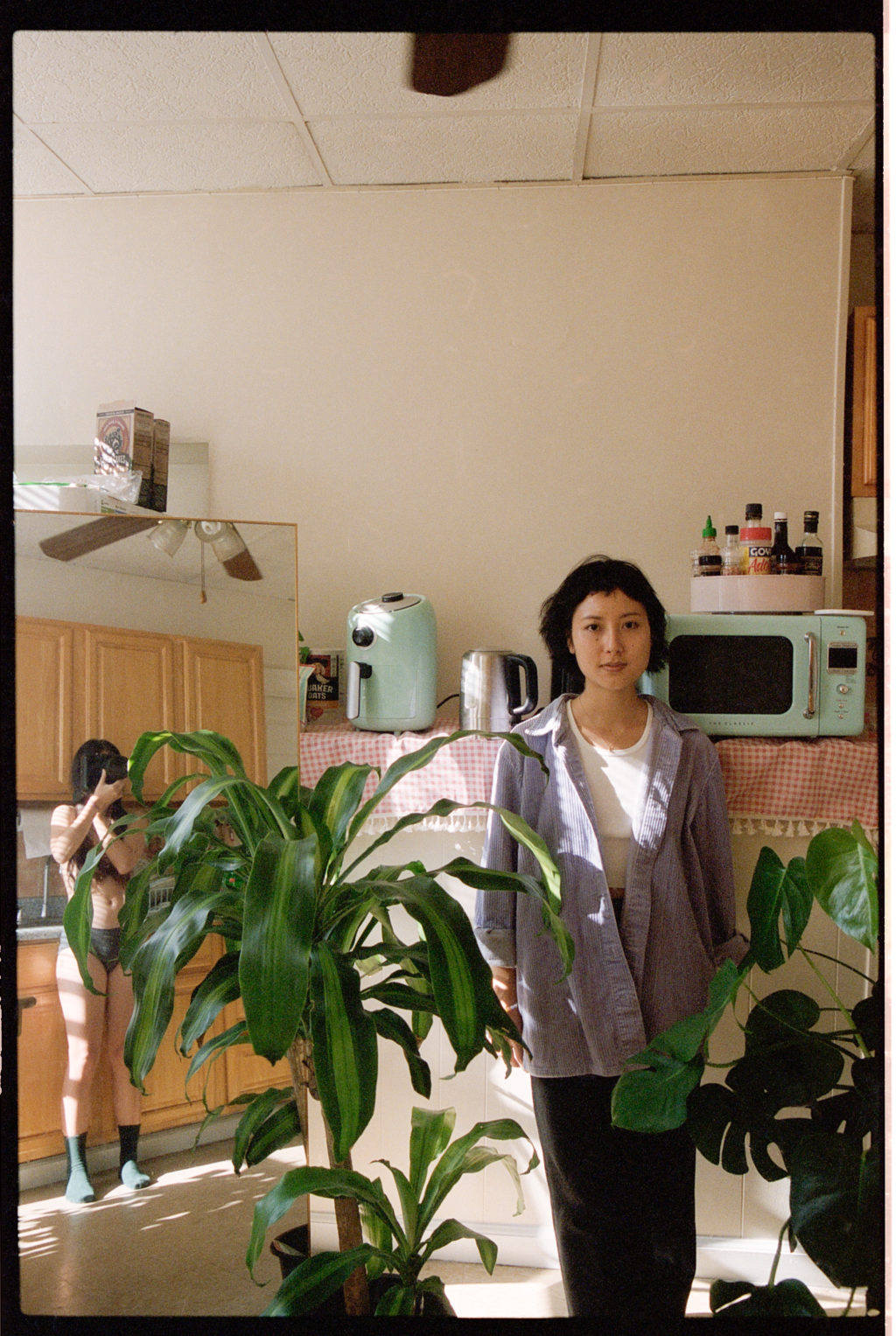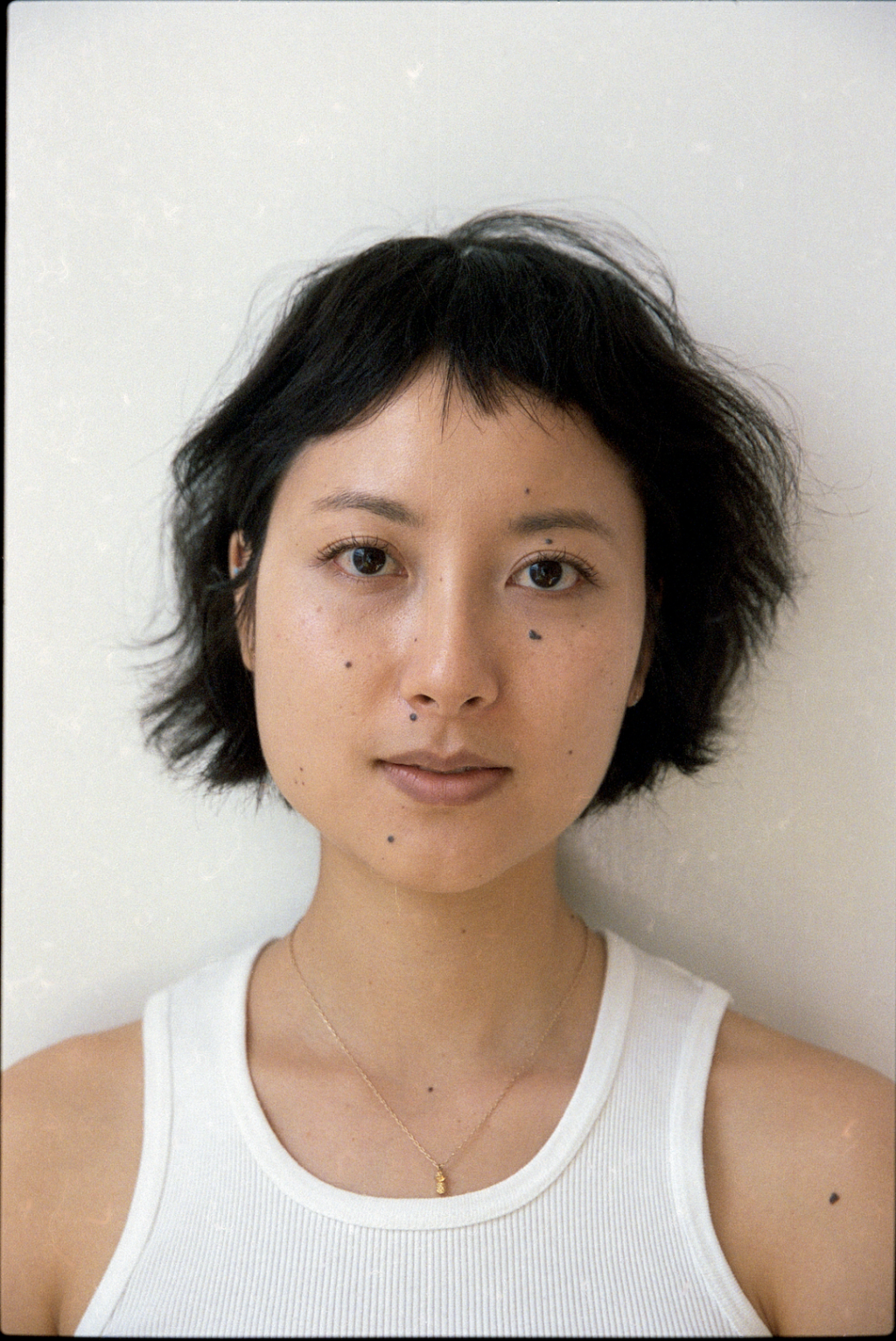Family Album
Photo Series by Ramona Jingru Wang
Interview by Lulu Yao Gioiello
Photo Series by Ramona Jingru Wang
Interview by Lulu Yao Gioiello
FAMILY ALBUM
To allow yourself to be photographed is to open up to the world, to become the other–vulnerable to how the photographer and audience views you and how you see yourself in their eyes.
Photographer Ramona Wang explores how images interact with reality by creating sincere interactions within her work. For her, photography is used as a gesture of love. By carefully carrying the subject’s trust and vulnerability on her shoulders and into her lens, she creates collective sanctuary capturing herself alongside the model. Both photographer and subject are exposed. She asks, how do we care for each other while creating and viewing art?
In Family Album, Ramona stages intimate moments with some of New York’s most distinct faces, contrasting their often high-production commercial identity with portraits among their personal spaces and family members. She chooses to de-tokenize, demystify and contextualize the POC artist’s identity. She wants the viewer to question if and why the appearance of POC bodies must make artwork and imagery inherently political.
Below, FAR–NEAR interviews Ramona and her photographic companions on vulnerability, what they keep close and how they approach the familiar.
FAR–NEAR What do you keep close to you?
Emily People who are kind, who I can trust and grow with, films and art that make me feel less alone, people who make me laugh, nostalgic memories, my phone even though I hate it, plants, a cold bottle of tea and a snack.

Emily at Home

Emily May Jampel

Emily May Jampel
FAR–NEAR Who is your family? How are they part of your life?
Emily My immediate family lives on Oahu, where I was born and raised, and in Hong Kong where my mother was born. I usually see them once or twice a year and talk with them on the phone, but it’s difficult because of the time difference. My mom likes sending me emails and photos of clothing she tries on at the mall and my dad sends me Facebook messages with photos of his lunch, sunsets and dogs, usually without captions.
My grandparents on my mom’s side live in Hong Kong and own a store that makes children’s school uniforms. My grandfather is 93 and still goes to work every morning. He and my grandmother have been married for 60 years and eat at the same dim sum restaurant for lunch everyday. I haven’t seen them in years but my grandma always sends me handwritten cards on my birthday and printed photos of her and my grandfather all dressed up with their friends having fancy dinners together. They always look very classy.
FAR–NEAR People often say coworkers, friends and such are “like family,” do you believe this? What does this mean to you?
Emily This might be cynical but my first thought is no. I feel like work relationships, at the end of the day, are fueled by money, so no matter how much you enjoy someone’s company within that structure, it still rests on the condition that this relationship is profitable and helps someone make money. But I guess you could argue that people might start off as coworkers and become genuine friends, or that money and transactional relationships also play a role in actual family relationships and even friendships too, so maybe it all just depends.
I think friends can definitely be like family. In many ways I feel more socially accepted and understood by my friends in the city than I do around my immediate family. There is something very special about the idea of a family that you can actively choose and create for yourself with people who you actually want to have in your life. I like the idea of choosing people to be in your family because you love them, rather than just loving someone because they happen to be in your family and you’re supposed to.
FAR–NEAR What does it mean to show you care? What is your caring language?
Emily I think my caring language is a combination of emotional and practical. Thanks to my emotionally repressed Asian upbringing, I tend to be rather shy about expressing care very directly and verbally and am more comfortable showing it through nonverbal acts like helping someone with practical things… doing someone a favor, buying them dinner or giving gifts. But I’m trying to be better about showing care through language because I think it’s important. I feel very cared for whenever someone invites me over and cooks for me. There’s something that feels very warm and maternal that I really love.
Emily I think my caring language is a combination of emotional and practical. Thanks to my emotionally repressed Asian upbringing, I tend to be rather shy about expressing care very directly and verbally and am more comfortable showing it through nonverbal acts like helping someone with practical things… doing someone a favor, buying them dinner or giving gifts. But I’m trying to be better about showing care through language because I think it’s important. I feel very cared for whenever someone invites me over and cooks for me. There’s something that feels very warm and maternal that I really love.
Emily I feel like there’s an interesting divide between certain Asian individuals and parts of Asian culture that are very familiar and well-loved, and others that aren’t. Cultural products like Pokemon, Anime, Bubble Tea, Chinese takeout, Miyazaki films, Muji and Uniqlo, or shows like Terrace House, all feel like familiar and mainstream things that almost everyone knows, or grew up with. Despite that, I don’t feel like there is the same level of familiarity with or excitement around Asian individuals for most people.
Even though there’s a small handful of media figures like Sandra Oh, Ali Wong or Lucy Liu who people might recognize and feel a sense of familiarity with, I feel like the majority of Asian people still carry the impression of being very foreign and unfamiliar. I think a lot of cultural representation still paints Asian people as strange, mysterious, unemotional, silent or foreign and robotic. I feel like even the media that is trying to have more Asian representation either ignores their character or actor’s Asian-ness entirely, in attempt at making them more familiar to a mainstream audience, or reduces them to their ethnicity and Asianness, thereby making them feel one-dimensional and even harder to relate to on a deeper and more intimate level.
Even the ways a lot of Asian people are styled in fashion or photography I think contributes to these larger impressions of unfamiliarity. I’ve done multiple shoots where I’ve been stylized identically as at least one other Asian female in the shoot, I guess because of this kind of “twin aesthetic” that seems to be really popular, and while I can see the aesthetic appeal of it and believe it was probably unintentional, I also feel like that’s one example of the kind of imagery that can easily and subtly feed into this impression of Asian people all being identical and indistinguishable from one another.
FAR–NEAR Afterlife by Hiroyuki Koreeda is one of our favorite films. In it, individuals of all ages pass through limbo and are asked to choose one memory from their life to bring with them into the afterlife. Many choose quiet, intimate moments over the spectacular. If you could keep one memory what would yours be?
Emily There’s this memory I have of the night I got to shoot with the photographer Ren Hang on a beach in California the summer after my sophomore year in college. I snuck out of the house where I was staying in the middle of the night and got into this old beat up car with a broken taillight with a bunch of beautiful Asian kids around my age who I had never met before with Ren in the front seat, and we drove down to the seaside while nostalgic Canto Pop played in the car speakers. All of us stripped down naked on the sand and climbed on these large cliffs and giant black rocks, laying on top of each other and contorting our bodies into strange shapes as Ren skipped around on the sand barefoot with his camera like an excited child with a new toy and took photos. The moon was really bright and the water was super cold but I honestly didn’t even care and felt like a wild animal in its natural state. I don’t think I’ve ever felt more alive and connected to nature or my body than I did that night. I just remember feeling so lucky and grateful for being Asian and exactly who I was at that moment in time. I don’t think I’ll ever experience that kind of magic ever again but I think about it all the time and want to keep chasing that feeling forever.
Photography
Ramona Jingru Wang
Edit
Lulu Yao Gioiello
@FAR___NEAR